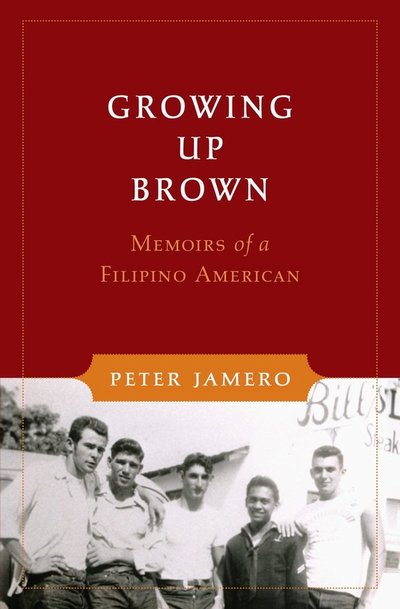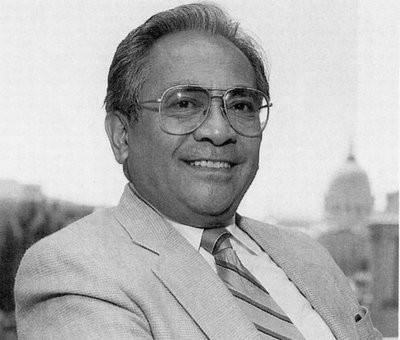October 19, 2006
UW Press publishes memoir of former social work faculty member
In his book Growing Up Brown: Memoirs of a Filipino American, Peter Jamero, former UW assistant professor of rehabilitation medicine and social work, recounts his early life in a farm labor camp in Livingston, Calif., and the path that took him to a career in academia and as an executive in health and human services programs in Sacramento, Washington, D.C., Seattle, and San Francisco.
What started out as a legacy piece for his children and grandchildren evolved into a memoir and sociopolitical analysis of the life and times of a second-generation Filipino American.
“When you get to be my age, 76, you think about leaving something for your kids. We have six kids; they were expressing a lot of interest in what I did during my life,” said Jamero. A friend of one of Jamero’s daughters brought some of his early work to the attention of UW Press.
“Editors there were interested. But they wanted something more than a travelogue and a series of birthdays. They urged me to write about how events shaped my life and to provide some analysis of how I dealt with parenting, discrimination, why I became an activist and an executive. I’m glad they did and I am appreciative.”
Filipinos came to the United States in the 1920s and 30s to fill the agricultural void after the exclusion of Japanese and Chinese workers, Jamero explained. The Philippines was a colony of the United States, so immigration was not a problem; Filipinos were nationals. They were a ready-made source of cheap labor.
Jamero’s parents ran a farm labor camp in central California. “Papa procured the work and was a contractor for these Filipino men. We had 80 to 100 men we housed and fed. My mother did the bookkeeping for the business and ran a general store. My dad was the cook. The kids helped with food preparation and disposal. We dug holes — for garbage, for outhouses.
“When I began the first grade I had to also learn English — I only spoke a Visayan dialect of the central Philippines.”
In high school, Jamero did well academically and socially and held a number of school offices. However, when he expressed an interest in going to college, he recalled being told, “Your kind belong in agriculture or the machine shop.”
“That was devastating for obvious reasons. I had to get over that,” said Jamero. Jamero joined the U.S. Navy at 17 and served in the Korean War. After the war, he took advantage of the G.I. Bill to pursue his dreams of attending college. He attended San Jose State University, majoring in pre-social work. He then received a scholarship to UCLA, where he earned a master’s degree in social work. Jamero later received a certificate in public affairs from Stanford University.
He became the first male and first Filipino to be employed as an adoptions worker in Sacramento County.
As his family grew, so did his career. “My first five kids were all born within six years. That was a big motivation to do well. I had to keep getting better jobs,” he said.
From his first job as an adoptions worker, Jamero went on to serve as division chief of the Aid to Needy Children program in Sacramento. He then went to Washington, D.C. as bureau chief of the U.S. Department of Health, Education, and Welfare; to Seattle where he served as regional representative for assistance payments, and to Olympia where he was the Washington State director of vocational rehabilitation under Governor Dan Evans. From 1979 to 1983 he served as assistant professor rehabilitation medicine and social work at the UW.
“While at the UW, I worked in social work on a project on disabilities for the School of Social Work and specialized on the vocational aspects of disabilities for the Department of Rehabilitation Medicine. I supervised rehab counselors at UWMC and administered federally funded projects for the department.”
After leaving the UW, Jamero served as the first director of the new Department of Human Resources for King County, vice president at United Way of Seattle/King County, department director of the San Francisco Human Rights Commission, and executive director of the Asian American Recovery Services in San Francisco.
While pleased with his professional achievements, Jamero is particularly proud of his record of community and political activism on behalf of social justice and minority causes.
The true legacy Jamero said he wants to leave for his children and grandchildren can be summarized in his guiding principles:
“Know thyself. Know what it means to be a person of color — your history, struggles, successes, aspirations. Appreciate who came before you.
“Understand how to handle discrimination and racism. Never use discrimination and racism as convenient excuse for not achieving. However, know that even people who possess degrees and professional and social positions are not immune from having discriminatory attitudes and practices.
“Examine your failures.
“Value education as an equalizer that can open doors, but does not guarantee success. “You must work hard.
“Make sure that your values are clear.”
Growing Up Brown: Memoirs of a Filipino American, UW Press, is available at the University Bookstore.


